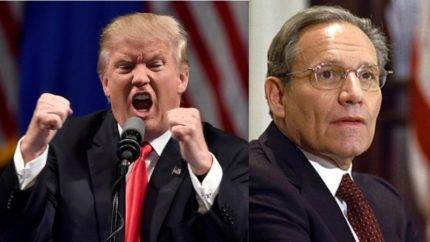Renowned journalist Bob Woodward has recently shed light on what he describes as President Donald Trump‘s apparent negligence in addressing the dual crises of the coronavirus pandemic as a national security and health threat. Woodward, known for his investigative reporting, discloses that Trump’s national security adviser, Robert O’Brien, and deputy adviser, Matt Pottinger, sounded the alarm in early January, warning the president about the severity of the impending virus.
In a recorded conversation, O’Brien emphasized that the virus would pose the most significant threat to Trump‘s presidency. Pottinger, drawing on his expertise on China and contacts in the medical field, provided a chilling prediction of 650,000 deaths, urging Trump to take immediate action. This revelation brings to light a stark contrast between the urgent advice given by key national security officials and Trump’s subsequent public statements downplaying the severity of the virus. Despite the alarming warnings, Trump reportedly dismissed the concerns, creating a stark dissonance between the information provided by his advisers and his public messaging.
Bob Woodward Criticized Trump’s Response as Death Toll Mounts in 2020
Woodward’s revelations, backed by recorded evidence, depict a timeline of Trump‘s response to the coronavirus crisis, raising questions about his handling of a national security and health emergency. The journalist highlights a specific moment six months later when Trump declared, “we’ve got it under control.” Bob Woodward confronts the president, pointing out that since that assertion, over 140,000 lives have been lost in the United States due to the virus.
The recorded conversations capture Trump‘s dismissive attitude towards the severity of the pandemic, contradicting the urgent warnings provided by his national security team. The contrast between private acknowledgments and public messaging becomes a focal point of critique. As the death toll continues to rise, Bob Woodward‘s reporting underscores the consequences of what some describe as a delayed and insufficient response to the pandemic. The revelations contribute to an ongoing discourse about leadership accountability in times of crisis and the potential implications for national security and public health.

Timeline of Trump’s Coronavirus Responses Reveals Troubling Pattern
Examining the timeline of Trump‘s responses to the coronavirus offers a comprehensive view Bob Woodward assertions of Trump’s response. As early as May 2018, the disbandment of the White House pandemic response team set the stage for a deficient preparedness strategy. By January 22, 2020, Trump declared, “We have it totally under control,” despite warnings from his own advisers. The subsequent timeline reveals a consistent pattern of downplaying the threat, praising China’s efforts, and minimizing the potential impact of the virus on the United States.
The juxtaposition of Trump‘s public statements with the private warnings from advisers illustrates a significant discrepancy in the administration’s messaging. The refusal to acknowledge the severity of the situation, coupled with the delay in implementing essential measures, may have contributed to the rapid spread of the virus in the early stages. This timeline provides a critical emphasizing for the importance of a proactive and transparent response to a global health crisis.
Contradictions and Denials – Trump’s Public Statements vs. Private Knowledge
The contrast between President Trump‘s public statements and his private knowledge is stark. On February 7, 2020, Trump acknowledged the severity of the virus in a private interview, stating, “It’s also more deadly than even your strenuous flu… This is deadly stuff.” However, in public, he continued to downplay the threat, asserting on February 26, 2020, that “This is a flu. This is like a flu.” Such contradictions raise concerns about the transparency and honesty of the administration in communicating vital information to the American public.
Trump‘s repeated assurances that the virus would miraculously disappear and his reluctance to take responsibility for the consequences of the pandemic further underscore the challenges faced by the nation. The concerning trend of misinformation and a lack of accountability at the highest levels of government, leaving the public in a precarious position during a health crisis.
Expert Warnings Ignored – A National Security and Health Threat Unchecked
The disclosure that Trump‘s trade adviser, Peter Navarro, warned in a January 2020 memo about the risk of a full-blown pandemic underscores the gravity of the situation. Navarro’s memo emphasized the lack of immune protection and the potential for millions of American lives to be imperiled. Despite such warnings from within his own administration, Trump continued to reassure the public that the situation was under control.
The consequences of dismissing these expert warnings became evident in the subsequent months as the virus spread rapidly across the country. The administration’s failure to take timely and decisive action raises questions about its commitment to national security and public health. As the death toll rose, the gap between expert advice and government action widened, contributing to a crisis that could have been mitigated with a more proactive approach.
Political Implications and Accountability
The revelations from Bob Woodward‘s interview have far-reaching political implications, particularly as they relate to Trump’s re-election year. The acknowledgment by Trump’s national security adviser that the virus would be the most significant threat to his presidency adds a layer of political complexity to the narrative. The decision to downplay the crisis, despite being aware of its severity, raises questions about the prioritization of political interests over the well-being of the American people.
This chapter of the Trump administration’s handling of the coronavirus pandemic adds fuel to the ongoing debate about accountability in leadership. As the nation grapples with the economic and public health fallout, the revelations may influence public opinion and contribute to a broader conversation about the need for transparent and responsible governance during times of crisis.
Future Implications and Lessons Learned
Looking ahead, the revelations from Bob Woodward‘s interview prompt a crucial examination of the lessons to be learned from the Trump administration‘s handling of the coronavirus. The disregard for early warnings, the contradictions in public messaging, and the delayed implementation of preventive measures highlight vulnerabilities in the nation’s crisis response mechanisms.
As the country navigates the ongoing pandemic and prepares for future challenges, the importance of a transparent, science-driven approach to national security and public health becomes more evident. The public’s demand for accountability and a commitment to learning from past mistakes will undoubtedly shape the approach to future crises, ensuring a more resilient and responsive governance structure.
Bob Woodward’s In-Depth Exploration of Trump’s White House Chaos
Bob Woodward‘s connection with Donald Trump dates back to Trump’s presidential campaign in 2016 and extends into his presidency. Woodward covered Trump extensively, providing insights into the inner workings of the White House. One notable instance of Bob Woodward‘s involvement with Trump is the release of his book “Fear: Trump in the White House,” published in September 2018.
“Fear” delves into the Trump administration’s inner workings, offering a detailed and often critical look at the president and his decision-making process. The book is based on extensive interviews with sources close to the administration, including top officials and aides. It paints a picture of a White House rife with internal conflicts, policy disagreements, and a leadership style that Bob Woodward portrays as chaotic.
One key revelation from “Fear” is a quote attributed to then-Chief of Staff John Kelly, who reportedly referred to Trump’s management style as “crazy-town.” The book also highlights instances where top officials allegedly worked to limit what they saw as impulsive or ill-advised decisions by the president.
Bob Woodward‘s Impactful Coverage of the Trump Presidency
Throughout Donald Trump‘s tenure in office, Bob Woodward remained a consistent and influential presence, offering invaluable insights, analysis, and a detailed chronicle of key moments, policy decisions, and controversies. Woodward’s revelations, supported by recorded evidence, construct a compelling timeline that scrutinizes Trump’s response to the coronavirus crisis, prompting critical reflections on his handling of a dual national security and health emergency.

Bob Woodward‘s reporting style, marked by meticulous research, in-depth interviews, and an unwavering commitment to uncovering the truth, has solidified his position as a respected figure in journalism. His ability to navigate the complexities of political landscapes and provide readers with a nuanced understanding of pivotal events has contributed to his reputation as a thorough and insightful reporter.
It’s worth acknowledging the mixed reception of Bob Woodward‘s reporting. Supporters commend his dedication to investigative journalism and his knack for unearthing significant details, while critics occasionally question the methods employed or the veracity of specific claims. Despite this, Woodward’s history with Donald Trump stands as a testament to his persistent efforts to illuminate the inner workings of the Trump administration, offering the public a deeper comprehension of the challenges and intricacies within the highest echelons of power in the United States.














